There’s nothing better than having people cheering for you on the sidelines and advocating for you in the rooms you’re not in, especially as a business owner.

That’s where a brand champion comes in as someone who promotes your business to others and helps organically grow your loyalty base.
Let’s dive into why you need brand champions, how to get them, and how to incorporate them into your marketing strategy.
Table of Contents
- What is a brand champion?
- The Benefits of Brand Champions
- Common Types of Brand Champions
- What You Need Before Creating Brand Champions
Brand champions can be business owners, brand ambassadors, chief brand officers, employees, and customers. Any one who advocates for your company can be a brand champion.
The Benefits of Brand Champions
Brand champions do wonders for your public image. They sing the praises of your brand in a way that doesn’t feel like an advertisement. Below are some of the top benefits of working with a brand champion.
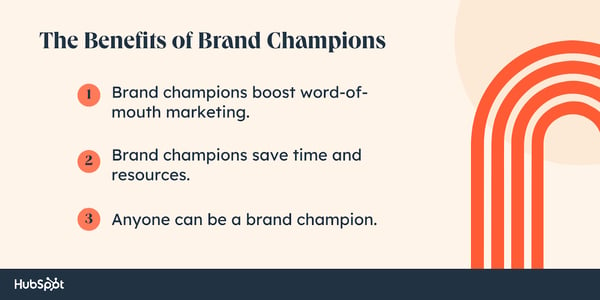
1. Brand champions boost word-of-mouth marketing.
Few marketing channels are more impactful than word-of-mouth marketing (WOMM), when people organically spread the word about a brand or product. This type of marketing is a great way to gain the trust of people who aren’t already customers.
In fact, 88% of people trust recommendations from people they know more than any other channel, according to a survey by Nielsen.
Brand champions are the ones behind this traction and promotion, so take an opportunity to hone in on these individuals if you want to take advantage of WOMM.
2. Brand champions save time and resources.
Brand champions generate organic buzz around your business. That’s one less part of your marketing budget that you have to worry about. Sure, you may offer them a discount code or referral link, but that’s pennies in comparison to advertising spending.
3. Anyone can be a brand champion.
Depending on the size of your business, you may have one or several champions. Sometimes, that role is embedded in your staff’s responsibilities.
For instance, an employer brand specialist is responsible for promoting a company’s culture and benefits to outside candidates. That, in itself, is a type of brand champion, as their role is centered around campaigning for your brand.
In a small company, the business owner can be the brand champion, motivating employees internally and networking externally to gain more customers.
You can say the same for brand ambassadors who partner with businesses to promote them and generate leads. However, here there is a contractual obligation for ambassadors to promote your brand. Champions may be incentivized to do so, but they’re not required to celebrate your brand.
The key takeaway is that anyone can be a brand champion, and the more champions your brand has, the stronger it will be.
Common Types of Brand Champions
A brand champion isn’t someone you have to search for or recruit. Many times, your best brand champions already play another role in your business. Below, let’s go over the most common types of brand champions so you know who to look for.
Employees
Start looking for brand champions internally. Employees can be your brand’s biggest fans, but only if they’re happy and engaged.
Studies show that how businesses treat their employees plays a big role in how trustworthy they seem. Especially in times of crisis, consumers look at how brands treat their own.
To create brand champions out of your employees, start by focusing on employer branding. Employer branding is a form of marketing in which the target audience is candidates interested in joining your company.
While the primary focus is on talent recruitment, employer branding can create a very positive perception of your brand to consumers as a secondary result.
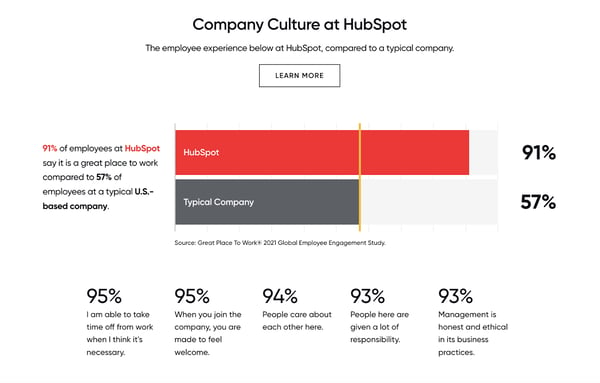
We’ve mentioned how important employees are when building brand trust. If consumers think you mistreat your employees or place profit over people, this can tarnish your brand image.
Internally, your employer branding specialist develops the strategies to showcase your internal brand champions. They can highlight exceptional employees and pass them the mic so they can share their experience with potential candidates.
At HubSpot, we have @HubSpotLife on Instagram, where we post employee takeovers, our Culture Code, and more.
This channel is an opportunity for our employees to tell the world about why they love working at HubSpot and share their personal experiences.
Customers
Your customers can be your brand’s greatest advocates. Think about it: Your customers already know what your brand stands for, what it offers, and how it treats its customers.
If they’ve had a positive experience with all of the above, then they’re more likely to champion your brand.
When customers organically advocate for your brand, this is a powerful form of word-of-mouth marketing. In fact, 55% of consumers learn about a product through word of mouth, which goes to show how a seemingly simple recommendation or testimonial can make an impact.
To help boost your brand’s WOMM, nurture your customer relationships to ensure they continue having a positive experience with your brand and will be more likely to spread the word.
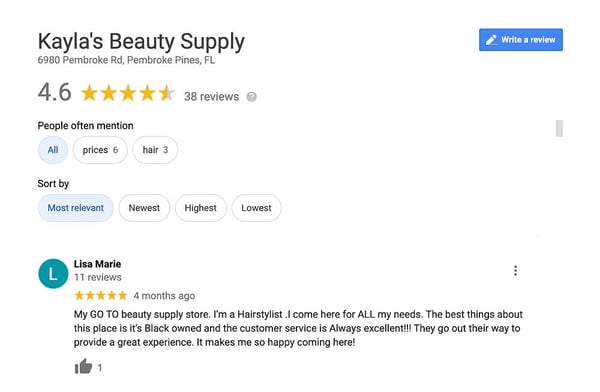
If you're running a campaign and want to include testimonials, reach out to your top supporters and ask them to participate.
You could repurpose those same testimonials for your website, landing pages, and more.
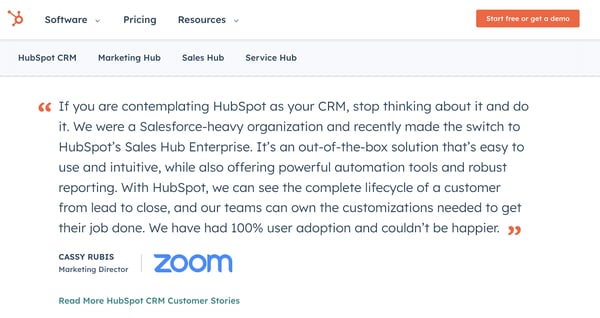
Another way to amplify your champions’ voices is by offering them custom referral codes.
When your champion refers someone to your brand, they and the recipient get a discount on their next purchase. And you gain a new customer — it’s a win-win-win.
Social Media Followers
Think of your social media followers as brand champions in training. They already like your brand — that’s why they're following you.
The more you nurture your relationship with them and build a community, the more loyal they’ll become. Eventually, they’ll turn into brand champions.
Positive social media content around your brand provides act as helpful case studies. Social proof is a way to gain trust from consumers who are uncertain about your brand, whether they are considering a purchase or following you on Instagram.

Pay attention to people who are advocating for your brand on social media and find ways to engage with them even further.
There are countless ways to engage your community on social media, including:
- Responding to comments.
- Creating private groups.
- Creating polls and surveys.
- Conducting Q&As.
- Going live with your followers.
- Reposting user-generated content.
What You Need Before Creating Brand Champions
There are a few prerequisites you need before you can start leveraging brand champions for your business. With these prerequisites in place, you’ll have an even greater chance of seeing success with your brand champion marketing.
Clear Vision, Mission, and Values
As with any marketing initiative, a deep understanding of your brand’s vision, mission, and values is critical.
These branding essentials will help guide everything you do, from selecting the right brand champions to relaying the messaging you want to be shared about your business.
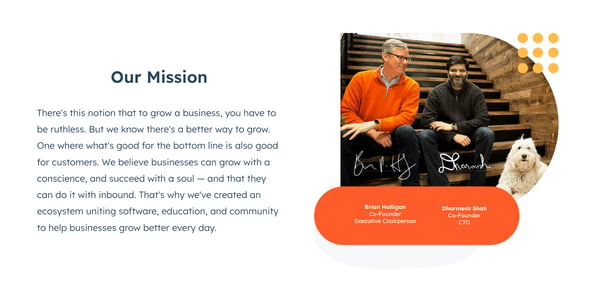
If you’re unclear about what your mission is or what values your brand stands for, then your customers or employees will be, too.
Sentiment Understanding
Whether you want your brand champions to be current employees or customers, you have to first understand how these individuals feel about your brand.
If you want to create brand champions internally, start by conducting regular employee net promoter score (eNPS) surveys. This will tell you how satisfied your employees are and let you know how you can better support them.

Once you identify opportunities for improvement, be sure to follow through with action to let your employees know their voices are heard and taken seriously.
You can do the same thing with customers. Choose a handful of customers who would make good brand champions and have them take a survey or participate in a focus group to collect feedback.

Having these insights into brand sentiment gives you a starting point when choosing the right brand champions and understanding how they can best advocate your brand.
Structure
Before you can have brand champions working toward success with you, you need to have the right systems in place. This can require a little more effort and structural implementations if you want your employees to become brand champions.
For example, you want to create an environment that creates happy employees, because happy employees make great champions who will boost your brand without you even asking.
It’s like when you love a product you’ve just bought. You’ll find any opportunity to tell people how much you love it — even if you don’t have a 10% referral discount code.
If your company is publicly traded, consider offering your employees restricted stock units (RSUs). RSUs are stocks given to employees as a form of compensation with a vesting schedule that can span anywhere from one to a few years after the employee’s start date.
Giving your employees an equity stake in your company can build their loyalty to your company and have them invested in its growth.
Other ways to turn your employees into brand champions include:
- Providing professional development opportunities.
- Investing in diversity and inclusion initiatives, such as employee resource groups (ERGs).
- Creating psychological safety.
The same ideas can be applied to customers that you want to be brand champions for your business. Have a structure or system in place before bringing on these brand champions. The system should make it easy for brand champions to advocate or share promos about your business.
For example, you could create a referral discount code for customers to share on social media.
Or, create a channel that helps communicate to brand champions when you have product launches or major announcements coming up that you want them to help you share.
Tap Into Your Brand Champions
When leveraged in the right ways, brand champions can be powerful advocates for your business.
These individuals — whether they’re employees or customers — create an organic channel that helps spread awareness about your brand and paints your business in a positive light.
from Marketing https://blog.hubspot.com/marketing/brand-champion
There’s nothing better than having people cheering for you on the sidelines and advocating for you in the rooms you’re not in, especially as a business owner.

That’s where a brand champion comes in as someone who promotes your business to others and helps organically grow your loyalty base.
Let’s dive into why you need brand champions, how to get them, and how to incorporate them into your marketing strategy.
Table of Contents
- What is a brand champion?
- The Benefits of Brand Champions
- Common Types of Brand Champions
- What You Need Before Creating Brand Champions
Brand champions can be business owners, brand ambassadors, chief brand officers, employees, and customers. Any one who advocates for your company can be a brand champion.
The Benefits of Brand Champions
Brand champions do wonders for your public image. They sing the praises of your brand in a way that doesn’t feel like an advertisement. Below are some of the top benefits of working with a brand champion.

1. Brand champions boost word-of-mouth marketing.
Few marketing channels are more impactful than word-of-mouth marketing (WOMM), when people organically spread the word about a brand or product. This type of marketing is a great way to gain the trust of people who aren’t already customers.
In fact, 88% of people trust recommendations from people they know more than any other channel, according to a survey by Nielsen.
Brand champions are the ones behind this traction and promotion, so take an opportunity to hone in on these individuals if you want to take advantage of WOMM.
2. Brand champions save time and resources.
Brand champions generate organic buzz around your business. That’s one less part of your marketing budget that you have to worry about. Sure, you may offer them a discount code or referral link, but that’s pennies in comparison to advertising spending.
3. Anyone can be a brand champion.
Depending on the size of your business, you may have one or several champions. Sometimes, that role is embedded in your staff’s responsibilities.
For instance, an employer brand specialist is responsible for promoting a company’s culture and benefits to outside candidates. That, in itself, is a type of brand champion, as their role is centered around campaigning for your brand.
In a small company, the business owner can be the brand champion, motivating employees internally and networking externally to gain more customers.
You can say the same for brand ambassadors who partner with businesses to promote them and generate leads. However, here there is a contractual obligation for ambassadors to promote your brand. Champions may be incentivized to do so, but they’re not required to celebrate your brand.
The key takeaway is that anyone can be a brand champion, and the more champions your brand has, the stronger it will be.
Common Types of Brand Champions
A brand champion isn’t someone you have to search for or recruit. Many times, your best brand champions already play another role in your business. Below, let’s go over the most common types of brand champions so you know who to look for.
Employees
Start looking for brand champions internally. Employees can be your brand’s biggest fans, but only if they’re happy and engaged.
Studies show that how businesses treat their employees plays a big role in how trustworthy they seem. Especially in times of crisis, consumers look at how brands treat their own.
To create brand champions out of your employees, start by focusing on employer branding. Employer branding is a form of marketing in which the target audience is candidates interested in joining your company.
While the primary focus is on talent recruitment, employer branding can create a very positive perception of your brand to consumers as a secondary result.

We’ve mentioned how important employees are when building brand trust. If consumers think you mistreat your employees or place profit over people, this can tarnish your brand image.
Internally, your employer branding specialist develops the strategies to showcase your internal brand champions. They can highlight exceptional employees and pass them the mic so they can share their experience with potential candidates.
At HubSpot, we have @HubSpotLife on Instagram, where we post employee takeovers, our Culture Code, and more.
This channel is an opportunity for our employees to tell the world about why they love working at HubSpot and share their personal experiences.
Customers
Your customers can be your brand’s greatest advocates. Think about it: Your customers already know what your brand stands for, what it offers, and how it treats its customers.
If they’ve had a positive experience with all of the above, then they’re more likely to champion your brand.
When customers organically advocate for your brand, this is a powerful form of word-of-mouth marketing. In fact, 55% of consumers learn about a product through word of mouth, which goes to show how a seemingly simple recommendation or testimonial can make an impact.
To help boost your brand’s WOMM, nurture your customer relationships to ensure they continue having a positive experience with your brand and will be more likely to spread the word.

If you're running a campaign and want to include testimonials, reach out to your top supporters and ask them to participate.
You could repurpose those same testimonials for your website, landing pages, and more.

Another way to amplify your champions’ voices is by offering them custom referral codes.
When your champion refers someone to your brand, they and the recipient get a discount on their next purchase. And you gain a new customer — it’s a win-win-win.
Social Media Followers
Think of your social media followers as brand champions in training. They already like your brand — that’s why they're following you.
The more you nurture your relationship with them and build a community, the more loyal they’ll become. Eventually, they’ll turn into brand champions.
Positive social media content around your brand provides act as helpful case studies. Social proof is a way to gain trust from consumers who are uncertain about your brand, whether they are considering a purchase or following you on Instagram.

Pay attention to people who are advocating for your brand on social media and find ways to engage with them even further.
There are countless ways to engage your community on social media, including:
- Responding to comments.
- Creating private groups.
- Creating polls and surveys.
- Conducting Q&As.
- Going live with your followers.
- Reposting user-generated content.
What You Need Before Creating Brand Champions
There are a few prerequisites you need before you can start leveraging brand champions for your business. With these prerequisites in place, you’ll have an even greater chance of seeing success with your brand champion marketing.
Clear Vision, Mission, and Values
As with any marketing initiative, a deep understanding of your brand’s vision, mission, and values is critical.
These branding essentials will help guide everything you do, from selecting the right brand champions to relaying the messaging you want to be shared about your business.

If you’re unclear about what your mission is or what values your brand stands for, then your customers or employees will be, too.
Sentiment Understanding
Whether you want your brand champions to be current employees or customers, you have to first understand how these individuals feel about your brand.
If you want to create brand champions internally, start by conducting regular employee net promoter score (eNPS) surveys. This will tell you how satisfied your employees are and let you know how you can better support them.

Once you identify opportunities for improvement, be sure to follow through with action to let your employees know their voices are heard and taken seriously.
You can do the same thing with customers. Choose a handful of customers who would make good brand champions and have them take a survey or participate in a focus group to collect feedback.

Having these insights into brand sentiment gives you a starting point when choosing the right brand champions and understanding how they can best advocate your brand.
Structure
Before you can have brand champions working toward success with you, you need to have the right systems in place. This can require a little more effort and structural implementations if you want your employees to become brand champions.
For example, you want to create an environment that creates happy employees, because happy employees make great champions who will boost your brand without you even asking.
It’s like when you love a product you’ve just bought. You’ll find any opportunity to tell people how much you love it — even if you don’t have a 10% referral discount code.
If your company is publicly traded, consider offering your employees restricted stock units (RSUs). RSUs are stocks given to employees as a form of compensation with a vesting schedule that can span anywhere from one to a few years after the employee’s start date.
Giving your employees an equity stake in your company can build their loyalty to your company and have them invested in its growth.
Other ways to turn your employees into brand champions include:
- Providing professional development opportunities.
- Investing in diversity and inclusion initiatives, such as employee resource groups (ERGs).
- Creating psychological safety.
The same ideas can be applied to customers that you want to be brand champions for your business. Have a structure or system in place before bringing on these brand champions. The system should make it easy for brand champions to advocate or share promos about your business.
For example, you could create a referral discount code for customers to share on social media.
Or, create a channel that helps communicate to brand champions when you have product launches or major announcements coming up that you want them to help you share.
Tap Into Your Brand Champions
When leveraged in the right ways, brand champions can be powerful advocates for your business.
These individuals — whether they’re employees or customers — create an organic channel that helps spread awareness about your brand and paints your business in a positive light.


No hay comentarios:
Publicar un comentario